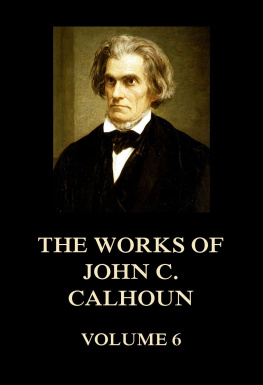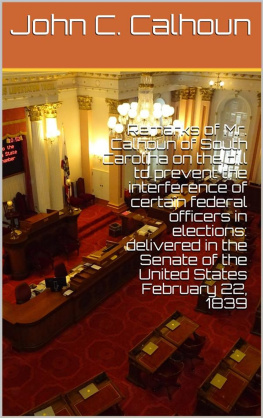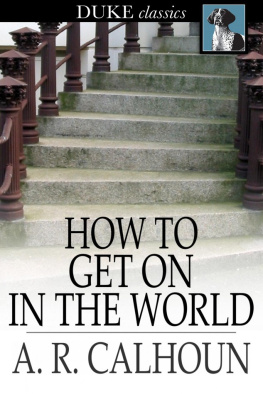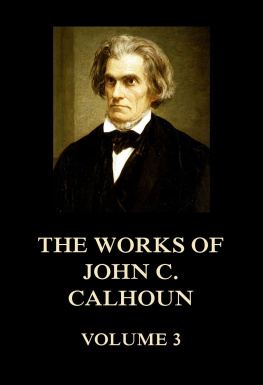PREFACE.
In the present volume the Editor has endeavored to bring together, without special reference to subject or dates, such Papers as may, in the main, be ranked under the head of Political Essays.
Some of these have never before been published; while others appear in a different, if not a more perfect state. They were, for the most part, written at the instance, and for the use of his friends, who, in preparing them for the Press, were allowed and exercised some liberty of private judgment, as well as freedom of criticism. These privileges were, no doubt, cautiously and discreetly used; but in this collection of his Works, the Editor has felt himself constrained to adhere strictly to the original manuscripts of the author, in all cases where they could be procured.
He regrets, however, to state that he has not been always successful in his efforts to obtain the originals. Many, it is to be feared, are now irretrievably lost; and amongst them that of the Address to his political friends and supporters,which is the more to be regretted as the Editor has reason to believe it contained some important matter which does not appear in the printed Copy.
The Exposition, as well as the Report prepared for the Committee on Federal Relations, and the Addresses (the one to the People of South Carolina, and the other to the People of the United States), are copied from the originals in the handwriting of the author. The first varies somewhat from the printed copy; and the curious student may, if he desire it, compare the two, as well as the Report and Addresses (never before published), with those which were adopted in their stead.
The Editor, in an Appendix to the volume, has deemed it proper to insert so much of the Correspondence between Gen. Jackson and Mr. Calhoun, with the accompanying papers, as the latter thought it expedient to place before the public at the time. These, however, do not embrace all the papers connected with the subject.
Others exist which may, and probably will hereafter appear in another form.
MEADOWGROVE, June 1st, 1855.
REPORTS AND PUBLIC LETTERS.
EXPOSITION.
Original Draft of the South Carolina Exposition, prepared for the Special Committee on the Tariff, and, with considerable alterations, adopted by the Legislature of South Carolina, December, 1828.
The Committee of the Whole, to whom were referred the Governor's Message and various memorials on the subject of the Tariff, having reported, and the House having adopted the following resolution, viz.: Resolved, That it is expedient to protest against the unconstitutionality and oppressive operation of the system of protecting duties, and to have such protest entered on the Journals of the Senate of the United States-Also, to make a public exposition of our wrongs and of the remedies within our power, to be communicated to our sister States, with a request that they will co-operate with this State in procuring a repeal of the Tariff for protection, and an abandonment of the principle; and if the repeal be not procured, that they will co-operate in such measures as may be necessary for arresting the evil.
Resolved, That a committee of seven be raised to carry the foregoing resolution into effect: which was decided in the affirmative, and the following gentlemen appointed on the committee, viz.: JAMES GREGG, D. L. WARDLAW, HUGH S. LEGARE, ARTHUR P. HAYNE, WM. C. PRESTON, WILLIAM ELLIOTT, and R. BARNWELL SMITH.
The Special Committee to whom the above Resolution was referred, beg leave to Report the following Exposition and Protest The committee have bestowed on the subjects referred to them the deliberate attention which their importance demands; and the result, on full investigation, is a unanimous opinion that the act of Congress of the last session, with the whole system of legislation imposing duties on imports,not for revenue, but the protection of one branch of industry at the expense of others,is unconstitutional, unequal, and oppressive, and calculated to corrupt the public virtue and destroy the liberty of the country; which propositions they propose to consider in the order stated, and then to conclude their report with the consideration of the important question of the remedy.
The committee do not propose to enter into an elaborate or refined argument on the question of the constitutionality of the Tariff system. The General Government is one of specific powers, and it can rightfully exercise only the powers expressly granted, and those that may be necessary and proper to carry them into effect, all others being reserved expressly to the States or the people. It results, necessarily, that those who claim to exercise power under the Constitution, are bound to show that it is expressly granted, or that it is necessary and proper as a means to some of the granted powers. The advocates of the Tariff have offered no such proof. It is true that the third section of the first article of the Constitution authorizes Congress to lay and collect an impost duty, but it is granted as a tax power for the sole purpose of revenue, a power in its nature essentially different from that of imposing protective or prohibitory duties.
Their objects are incompatible. The prohibitory system must end in destroying the revenue from imports. It has been said that the system is a violation of the spirit, and not the letter of the Constitution. The distinction is not material.
The Constitution may be as grossly violated by acting against its meaning as against its letter; but it may be proper to dwell a moment on the point in order to understand more fully the real character of the acts under which the interest of this, and other States similarly situated, has been sacrificed. The facts are few and simple. The Constitution grants to Congress the power of imposing a duty on imports for revenue, which power is abused by being converted into an instrument of rearing up the industry of one section of the country on the ruins of another. The violation, then, consists in using a power granted for one object to advance another, and that by the sacrifice of the original object. It is, in a word, a violation by perversion,the most dangerous of all because the most insidious and difficult to resist. Others cannot be perpetrated without the aid of the judiciary;this may be by the Executive and Legislative departments alone. The courts cannot look into the motives of legislators. They are obliged to take acts by their titles and professed objects, and if these be constitutional, they cannot interpose their power, however grossly the acts may, in reality, violate the Constitution. The proceedings of the last session sufficiently prove that the House of Representatives are aware of the distinction, and determined to avail themselves of its advantage.
In the absence of arguments, drawn from the Constitution itself, the advocates of the power have attempted to call in the aid of precedent. The committee will not waste their time in examining the instances quoted. If they were strictly in point, they would be entitled to little weight.
Ours is not a Government of precedents, nor can they be admitted, except to a very limited extent, and with great caution, in the interpretation of the Constitution, without changing, in time, the entire character of the instrument.
The only safe rule is the Constitution itselfor, if that be doubtful, the history of the times. In this case, if doubts existed, the journals of the Convention itself would remove them. It was moved in that body to confer on Congress the very power in question to encourage manufactures, but it was deliberately withheld, except to the extent of granting patent rights for new and useful inventions. Instead of granting the power, permission was given to the States to impose duties, with the consent of Congress, to encourage their own manufactures; and thus, in the true spirit of justice, imposing the burden on those who were to be benefited. But, giving the precedents every weight that may be claimed for them, the committee feel confident that, in this case, there are none in point previous to the adoption of the present Tariff system. Every instance which has been quoted, may fairly be referred to the legitimate power of Congress, to impose duties on imports for revenue. It is a necessary incident of such duties to act as an encouragement to manufactures, whenever imposed on articles which may be manufactured in our country. In this incidental manner, Congress has the power of encouraging manufactures; and the committee readily concede that, in the passage of an impost bill, that body may, in modifying the details, so arrange the provisions of the bill, as far as it may be done consistently with its proper object, as to aid manufactures. To this extent Congress may constitutionally go, and has gone from the commencement of the Government, which will fully explain the precedents cited from the early stages of its operation.










